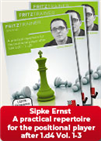Text and photos: Shireen Habiballah / FIDE
The prison yard of the Penitentiary Institution (PI) Alphen has undergone a special enhancement: a self-made chess table, crafted by the inmates themselves.
This black-and-white checkered table is not only a testament to their craftsmanship but also a contribution to a stimulating environment within the prison. The initiative was inaugurated with a ceremony led by none other than eight-time Dutch chess champion Loek van Wely. This ceremony marks the beginning of a plan to distribute no fewer than 35 chess tables across all penitentiary institutions in the Netherlands, allowing chess to play a more significant role in the inmates’ daily lives.
On Tuesday, May 14, chess champion Loek van Wely came to PI Alphen to unveil the first chess table and to test it out immediately. Four of the best inmate chess players were allowed to challenge him. One of them, who learned to play chess within the prison walls, shared: “I’m going to do my best to win”, he laughed. “We play a lot in the ward and during yard time. I hope this beautiful table will soon have a permanent place in our yard”.
 In 60 minutes you will get a crash course how to play such a complicated opening like the Sicilian Najdorf by the hands of GM van Wely who knows by experience how the dangers look like! The contents:
In 60 minutes you will get a crash course how to play such a complicated opening like the Sicilian Najdorf by the hands of GM van Wely who knows by experience how the dangers look like! The contents:
• Video 1, 2, 3: how to survive versus whites most aggressive approach: 6. Bc4, 6. Be3 and 6 Bg5
• Video 4: how to deal with the latest fashion in the Najdorf 6. h3 and last but not least
• Video 5: how to play vs the more classical set ups 6. Be2 and 6. g3
A game of chess in prison is not a new phenomenon, but its potential is now being fully embraced. By placing chess tables in the yard, not only is the playing of the game encouraged, but also mental activity is promoted, helping PI create a more active living environment.
Loek sees great value in playing chess within prison walls. He mentioned:
It’s important to be in top physical and mental shape for the period after detention. Chess is a game that requires you to take your time, which fits well in this environment. It may be harsh, but here, you have the time to work on yourself. I hope everyone here gets the most out of themselves now that they have the time to develop within these walls.
Blitz chess
Van Wely played blitz chess against four inmates, where typically each player has from 3 to 5 minutes of thinking time for the entire game. In this case, Loek had just one minute on his clock, while each inmate had five minutes to give his opponents a chance to win. One inmate succeeded in beating the chess champion! Van Wely said:
 I give promising mainlines for white against all black’s main replies to 1.d4 d5 that are engine-proof, easy to learn and can be played almost instantly.
I give promising mainlines for white against all black’s main replies to 1.d4 d5 that are engine-proof, easy to learn and can be played almost instantly.
Especially with blitz chess, you often have to sit on your hands to avoid moving a piece too quickly, to not act under the pressure of the clock or the spectators’ eyes. This is also true in real life. I often think: if only more people played chess. Because through chess, you learn that acting out of emotion often does not lead to good ‘moves’.

Hidden strengths
Chess master Jop Delemarre was also present at the unveiling of the chess table. Jop, a former Dutch youth champion, participated several times in European and World Youth Championships. Additionally, he is a member of the ECU Social Commission, where he is responsible for the Chess for Freedom portfolio.
Delemarre frequently visits the PI Alphen prison to give clinics to inmates. He said:
Chess has many hidden powers. With chess, you have an objectivity that is the same for everyone. And while you play against others, you also fight against yourself.
A step forward
The prison director of PI Alphen does not see the chess table in the yard as just a game.
It offers inmates an opportunity to develop skills. Within our prison, we place a high value on sports. By encouraging sports activities, including mind sports, we stimulate inmates to reflect and engage positively. A game of chess certainly provides this and offers distraction, improving the living environment and thus enhancing our own safety.
With the chess tables in the yard of PI Alphen and the planned expansion to other institutions, the opportunities for growth and rehabilitation for inmates are increased. It is a small step toward a better future.
In this Video-Course we deal with different dynamic decisions involving pawns. The aim of this Course is to arm club/tournament players with fresh ideas which they can use in their own practice.
Links
























